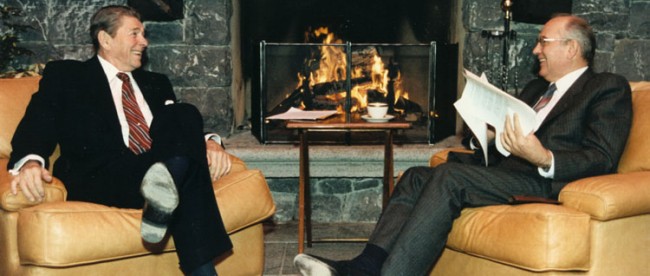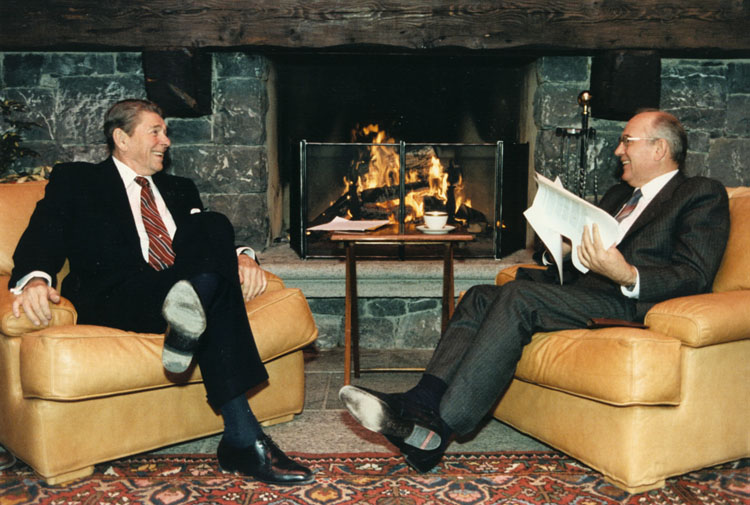Reagan and Gorbachev’s Green Pact


In November of 1985, American President Ronald Reagan and Soviet General Secretary Mikhail Gorbachev met in Geneva, Switzerland, to talk about ways to stem nuclear proliferation. The meeting was a momentous one; the two nations were engaged in the decades-long Cold War and were hardly on good terms. With the threat of global thermonuclear war omnipresent, the world was hoping that tha Geneve Summit would result in a thaw. It was a good first step, but by and large, that’s all it was. While, over time, the talks between the two sides would lead to agreements and treaties, the first Summit (despite the smiling faces depicted above) didn’t result in much beyond a joint statement and a promise to continue discussions.
The only thing substantive, perhaps? The two leaders came to an informal agreement: their nations would team up if aliens ever invaded.
Reagan, per future America Secretary of State Colin Powell, seemed to have an irrational fear of space invaders. Here’s a report by Foreign Policy magazine, citing Powell:
According to Colin Powell, national security advisor from 1987 to 1989, Reagan had been deeply affected by the 1951 film The Day the Earth Stood Still, in which space aliens warn earthlings that unless they stop settling their conflicts through war, the powers that be in the galaxy will destroy their planet. (During his presidency, Reagan repeatedly invoked the prospect of an alien invasion as a reason for the United States and the Soviet Union to overcome their differences. Whenever he did, Powell would mutter, “Here come the little green men.”)
But note that Powell worked for Reagan only after the Geneva Summit. Reagan’s invocations of alien invasions may not have been out of fear of extraterrestrials, but rather out of the Soviet threat. That is, perhaps Reagan saw the threat of a Klingon or Cardassian invasion as an opportunity — one he set in motion two years before Powell became his formal advisor.
Reagan knew, but Powell did not, that America and the Soviets had already discussed what to do in case of spacemen with laser beams. At one point during the 1985 Summit, Reagan and Gorbachev decided to take a walk along the lake to a nearby cabin, alone except for their translators. With no aides around (and certainly no press), the content of their conversations was less formal than over the rest of the two-day meeting — and, in turn, weren’t part of any formal statements issued thereafter. But in 2009, Gorbachev and the Secretary of State under Reagan, George Shultz, sat down for a conversation moderated by longtime American TV journalist Charlie Rose. You can watch that interview here if you’d like, but for the important part (for our purposes, at least), let’s just quote a subsequent article in the Christian Science Monitor:
“From the fireside house, President Reagan suddenly said to me [Gorbachev], ‘What would you do if the United States were suddenly attacked by someone from outer space? Would you help us?’
“I said, ‘No doubt about it.'”
“He said, ‘We too.'”
“So that’s interesting,” Gorbachev said to much laughter.
Thankfully, to date, no aliens have invaded the Earth yet (conspiracy theories notwithstanding), so we never had to find out if the two parties would treat this informal agreement as binding.
Bonus fact: Nearly a decade before the U.S. and the Soviet Union considered an anti-Martian (or whatever) alliance, another pair of powerhouses teamed up against a similar threat. In a 1978 comic, Superman and Muhammed Ali join forces against an extraterrestrial force. (Never mind that Superman himself is an alien.) Ali saves the Earth by knockout.
From the Archives: How Matthew Broderick Helped Shape American Computer Law: Another case of the movies helping guide President Reagan’s policies.
Related: “The Day The Earth Stood Still,” the 1951 version. A classic, earning 4.8 stars out of 5 across more than 2,000 reviews. (The 2008 remake isn’t as well regarded.)
